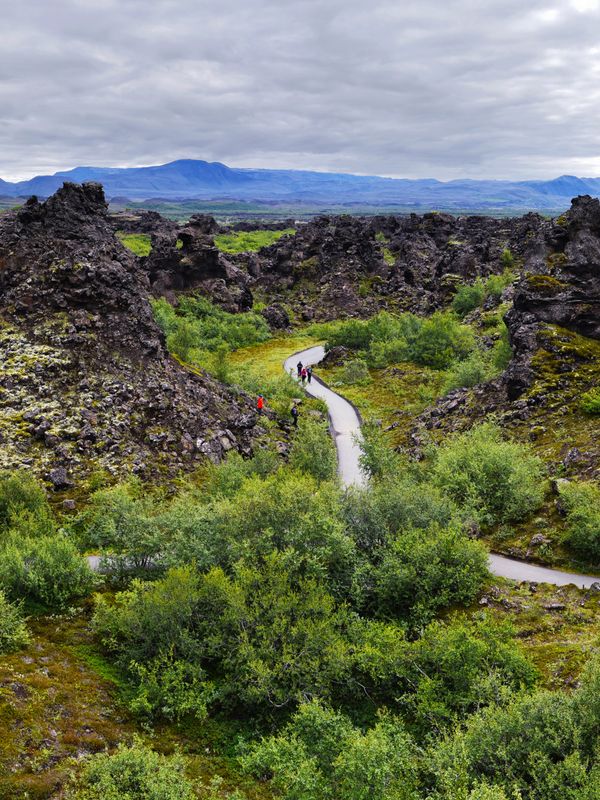
North Iceland’s Must-Do Hikes: A Guide to the Best Trails
Welcome to North Iceland, a part of the country that features plenty of gorgeous, windswept scenery, tempting you to jump out of your camper and explore on foot. If you’re an outdoor enthusiast seeking a bit of untamed wilderness, North Iceland offers some fantastic hiking trails.
There are hikes that take you through dark lava fields, along epic glacial canyons, and past snow-capped peaks. You can hike up volcanoes and toward rushing waterfalls, or simply conquer the lofty mountains, providing unbeatable views over this part of Iceland.
Below, we’ve rounded up what we think are some of the best hikes in North Iceland. Hiking enthusiasts are sure to find something they like here, and they’re all easy to add onto your Iceland campervan road trip.
Why Hiking Is the Best Way to Explore North Iceland
When it comes to experiencing Iceland's true essence, nothing beats exploring it on foot. Hiking allows you to immerse yourself in the sights, sounds, and smells of this mesmerizing landscape. Viewing the northern landscapes unfold from behind the windscreen is also wonderful, but there’s something so Icelandic about hitting the trails, feeling the wind in your face, and feeling alone in natural landscapes unlike anywhere else on earth.
As we’ve already mentioned, North Iceland is a region of the country that boasts it all. Black sand beaches, grumbling volcanoes, steamy hot springs and geothermal power, and rushing glacial rivers and waterfalls. As you traverse the trails, you'll very quickly fall in love with this region, a place that is often skipped over in lieu of the south.
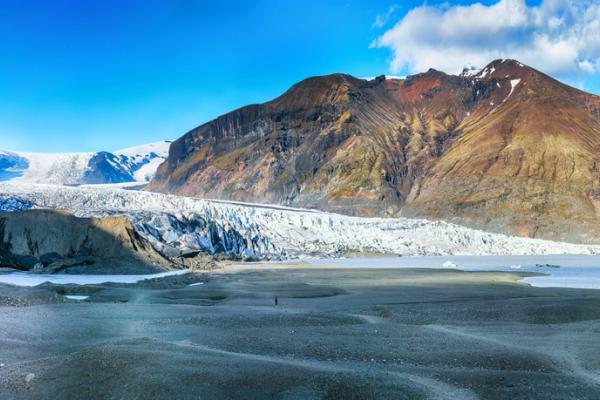
The Best Hikes in North Iceland
1. Jökulsárgljúfur Canyon Trail, from Dettifoss to Ásbyrgi
The first hiking trail on this list is a doozy, taking you along the edge of the spectacular Jökulsárgljúfur canyon, carved by the glacial river Jökulsá á Fjöllum. This canyon is home to Dettifoss, Europe’s most powerful waterfall, which is the starting point for hiking trails heading further north along the canyon.
It’s important to note that this trail is also one of the most challenging on this list; the canyon stretches for 34km (21 mi) until it reaches the horseshoe-shaped canyon called Ásbyrgi, anchoring the very northern tip of Vatnajökull National Park. This canyon is a bit of an oasis, with a small green forest and fields surrounded by towering cliffs.
Hiking this trail usually takes two days, with an overnight stop at the Hljóðaklettur Campsite. This means that it also involves some logistics; you’ll need to take a tent along with you for the hike, and supplies. Then there’s also the fact that you’ll have to leave your campervan behind at Dettifoss. Luckily, during the summer, a bus runs from Ásbyrgi down to Dettifoss, making this one-way hike a feasible option for campervan travelers.
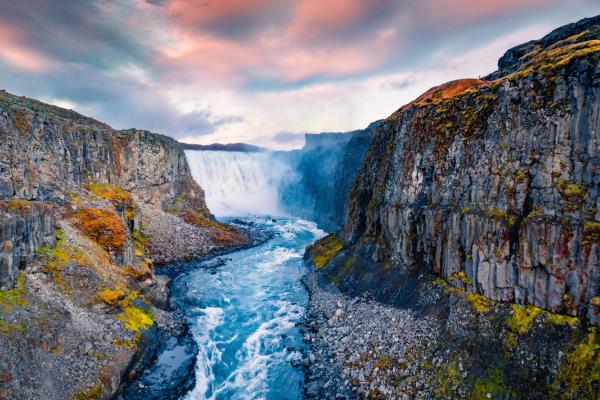
2. Hljóðaklettur Cave in Jökulsárgljúfur Canyon
If you’re looking for a shorter version of the above hiking trail, you can also drive from Dettifoss to Hljóðaklettur and jump on the hiking trail from this point. From the parking area here, there are two loops to choose from, a shorter one that’s about 3km (1.8mi) or a longer one that stretches to about 5km (3.1mi). The shorter one takes you to what’s called the Echo Rocks, which are the remnants of ancient volcanoes that have been eroded by the Jökulsá River. You can admire the different shapes and patterns of the rocks and listen to the echoes they produce when you sing out. There are also caves and arches dotting the area.
The longer hike continues along the river, taking in some great views of the cliffs and some waterfalls. The destination of this trail is Rauðhólar, a set of red hills that contrast with the black basalt that surrounds them. You can climb up to the top of the hills and get a panoramic view of the canyon before returning back to your campervan.
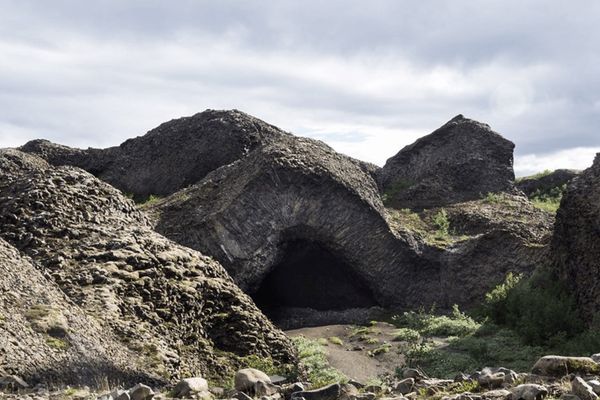
3. Ásbyrgi Canyon Rim Hiking Trails
We’re sticking inside the Vatnajökull National Park for this second hike, which takes place on the rims of Ásbyrgi Canyon. If you’ve driven here and parked at the visitor’s center, you’ll see that there are several hiking trails that run along the rim of the cliffs, with trails varying in length, but all offer panoramic views of the canyon and surrounding area.
The shortest and easiest is the trail that leads you up onto what’s called Eyjan Island, the large cliff in the middle of Ásbyrgi that separates the canyon into two sides. Longer trails venture up on the outer edges of the canyon, leading to the very bottom where the cliffs tower above the Botnstjörn pond, a tranquil spot where birds and fish thrive. From here the views are incredible, and the trail leads you through birch forests and through fields ripe with wild berries during the autumn.
4. The Hverfjall Volcano Hike
Down to Lake Myvatn now, where on the eastern edge of the lake you’ll find a massive crater formed from an eruption around 2500 years ago. Called Hverfjall, this volcanic crater is a wonderful hike that lets you experience a small taste of the sheer volcanic power brooding underground in this part of Iceland (the Krafla volcanic system runs right underneath).
The hike up to the crater rim is quite easy. It's steep, but it’ll only take about 30 minutes to reach the top. The trail is barren and often windswept, but the views from the top are worth the battle. They offer a panorama of Lake Myvatn, rolling hills, distant mountains, and bleak lava fields. If you're after something a bit longer, you can also choose to hike around the rim of the crater or begin the hike from the parking area at Dimmuborgir.
5. Húsavík Mountain
More known as one of the best places in Iceland to embark on a whale-watching tour, Húsavík is also a great place in North Iceland for a challenging hike. Behind town, you’ll see a large mountain looming, offering a big reward for those who choose to climb up to the peak. The views are out of this world, stretching from Skjálfandi Bay to the other side of the water, as well as inland.
The mountain is 417 m (1368 ft) high, and the hike is steep and rocky and requires some scrambling and climbing skills. It’s about 4 km (2.5 mi) long and takes between 1–2 hours, depending on your fitness level. You can start from the Húsavík church, where you can follow the signs to the trailhead. As always, be prepared for changing weather conditions and intense winds on the summit – it’s best to attempt this hike during the summer. After you’ve returned to town, you can also reward yourself with a beer at Húsavík Öl, the local brewery, or a luxurious soak at the GeoSea geothermal baths.
6. Glerárdalur Valley in Akureyri
For a relaxing and scenic hike, leading from Akureyri is the easy-going Glerárdalur valley, a lush and green corridor heading southwest of town. The valley is home to several waterfalls, streams, and ponds, as well as a variety of flora and fauna. You can follow the Glerá River, which runs through the valley, and see the impressive Glerárfoss waterfall, which drops 20 m (65 ft) into a gorge.
The hike is easy and flat and can be done in any season. The full trail is about 10 km (6.2 mi) long and takes about 3 hours to complete, but you can turn back at any time to make things shorter. The trailhead is at the end of the street Súluvegur. It’s a nice slice of nature if you spend the night at the nearby Hamrar Campsite.
7. Dreki Mountain Hut to Askja
Now for one of the more challenging hikes on this list: the trail from Dreki Mountain Hut to Askja. The trail itself isn’t so tough, but rather, getting to Dreki in the first place is a bit of a big deal. This destination is nestled in the northern highlands, at the end of some challenging F-roads that require river crossings. But the reward for making it out here is some of the most stunning landscapes contained in Vatnajökull National Park.
You start at the cozy mountain hut, which also doubles as a convenient campsite for you to stay at with your 4x4 camper. The trail then leads along the edge of the Drekagil Canyon, where you can marvel at the colorful rock formations and cascading waterfalls. You cross a bridge over the Jökulsá á Fjöllum River and then ascend to the rim of the Askja caldera. You are greeted by the sight of the turquoise lake Öskjuvatn, the deepest lake in Iceland, and the smaller crater lake Víti, which means "hell" in Icelandic. You can walk around the lakes and admire the contrast between the serene water and the rugged terrain, and you can also take a dip in the geothermal pool of Víti.
8. Dimmuborgir Lava Field
The final hike on this list involves trails that delve into the Dimmuborgir Lava Field, a captivating place of twisted lava that resembles towers and creates caves and arches. Translating to ‘Dark Castles’ in English, Dimmuborgir is a unique lava field in Iceland. Some of the towers reach impressive heights and will tower over you as you wander through the trails.
You start at the Dimmuborgir parking area, where you can choose from several well-marked trails of different lengths and difficulties. You follow the signs that lead you to the most impressive features of the area, such as the Kirkja (church), a large lava tube that resembles a Gothic cathedral, the Hallarflöt, a hole in the lava that offers a view of the Hverfjall crater, and the Borgarskora, a narrow passage between two high walls of lava. It’s also said that Dimmuborgir is the home of the Icelandic Yule Lads, the 13 Santa Clauses who descend on the towns every Christmas to get up to mischief.
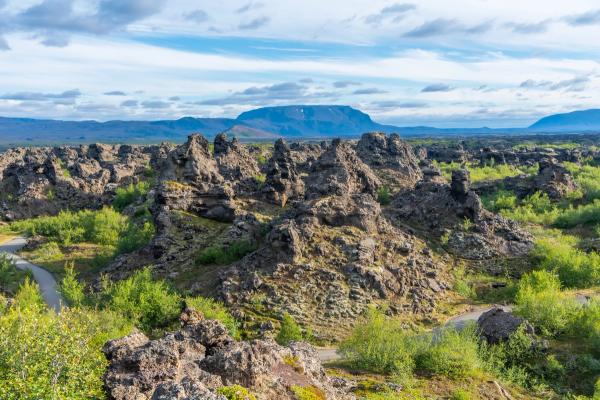
Planning Tips for Hiking in North Iceland
Before embarking on your hiking adventures in North Iceland, it's important to plan and prepare accordingly. Here are some essential tips to ensure a safe and enjoyable experience:
Check the weather: Iceland's weather can change rapidly, so be sure to check the forecast before setting out on your hike. Adjust your plans accordingly, and be prepared for different scenarios.
Pack the right gear: Dress in layers, wear sturdy hiking boots, and bring waterproof and windproof clothing. Don't forget essentials such as a first aid kit, plenty of water, and snacks.
Know your limits: Choose hikes that match your fitness level and experience. It's better to start with easier trails and gradually progress to more challenging ones. Listen to your body and take breaks when needed.
Respect nature and wildlife: Leave no trace behind and follow the principles of responsible hiking. Stay on designated trails, don't disturb wildlife, and avoid littering. This will help preserve the beauty of North Iceland for future generations and other travelers.
Conclusion
Hiking is the best way to experience North Iceland’s landscapes up close. From canyons and volcanic craters to quiet valleys and lava fields, the region has trails for every skill level. Planning ahead is key—check the weather, pack the right gear, and choose routes that match your experience. Whether you're taking on a tough multi-day trek or a short scenic walk, hiking here gives you a real sense of Iceland’s natural beauty.
